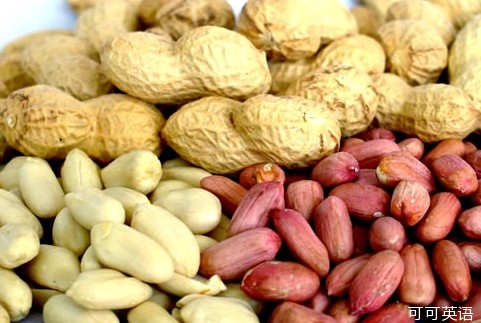(单词翻译:单击)

Pregnant women who eat more peanuts and tree nuts during pregnancy might be less likely to bear nut-allergic children, a new study suggests.
一项新的研究发现,孕期女性如果多食用花生和树坚果,可能会降低孩子坚果过敏的几率。
The research, published Monday in the journal JAMA Pediatrics, supports the current consensus among medical professionals that delaying the introduction of nuts, milk, fish, shellfish, eggs and other highly allergenic foods in young children doesn't prevent the development of food allergies, said Michael C. Young, associate clinical professor of pediatrics at Harvard Medical School, and a senior author of the study.
上述研究成果周一发表在《美国医学会小儿科期刊》(JAMA Pediatrics)上。医学专家目前的普遍共识是,推迟孩子食用坚果、牛奶、鱼、贝类、鸡蛋和其他高致敏性食品的时间,不会防止食物过敏的发生,哈佛医学院(Harvard Medical School)小儿科临床副教授兼文章的高级作者Michael C. Young表示,该研究结果支持了上述观点。
The findings inversely link a pregnant mother's consumption of peanuts or tree nuts with the onset of nut allergies in her child. The more nuts the mother ate while pregnant, or within a year before or after pregnancy, the lower the risk that the child would go on to develop nut allergies, Dr. Young said. The study doesn't demonstrate a causal relationship between a pregnant mother's diet and the onset of nut allergies in her offspring, he said.
研究结果表明,母亲孕期的花生或树坚果的食用量与儿童坚果过敏几率成反比。Young表示,母亲怀孕期间或者孕期前后一年内食用的坚果越多,孩子坚果过敏的风险越低。研究并未说明孕期母亲的饮食与儿童坚果过敏之间的因果关系。
The researchers stopped short of advising pregnant women to eat more nuts. Further, interventional studies -- in which researchers would separate participating pregnant women into groups and prescribe their diets, rather than simply track their consumption -- are required before they can make such a recommendation.
研究人员并未建议孕期女性多食用坚果,如果他们要这样建议,首先要进行干预性研究:研究人员将参与研究的孕期女性进行分组并规定她们的饮食,而不只是跟踪她们的食量。
Researchers led by A. Lindsay Frazier of the Dana-Farber/Boston Children's Cancer and Blood Disorders Center in Boston, analyzed data from 8,205 children born between Jan. 1, 1990 and Dec. 31, 1994 to mothers who had reported their diets at or around the time of pregnancy. Of the children they tracked, 140 had developed a peanut or tree nut allergy by 2009. All self-reported cases of physician-diagnosed nut allergies were reviewed independently by two pediatricians, according to the study.
Dana-Farber/波士顿儿童癌症与血液疾病中心(Dana-Farber/Boston Children's Cancer and Blood Disorders Center)的弗雷泽(A. Lindsay Frazier)领导的研究人员分析了1990年1月1日至1994年12月31日期间出生的8,205名儿童的数据,这些孩子的母亲向研究人员汇报了她们在怀孕期间或者怀孕前后的饮食情况。研究发现,他们跟踪的这些儿童中,到2009年有140人对花生或坚果过敏。所有自行报告被医生诊断为坚果过敏的儿童都经过了两位儿科医生的独立检查。
The prevalence of childhood peanut allergy in the U.S. has become an 'epidemic' in recent years, Dr. Young said. The rate of 1.4% in 2010 is more than triple the rate of 0.4% in 1997, according to the study. Peanut and tree nut allergies tend to overlap, and such allergies typically become evident with a child's first known exposure to peanuts or tree nuts, the study said. It defines tree nuts as walnuts, almonds, pistachios, cashews, pecans, hazelnuts, macadamias and Brazil nuts.
Young表示,近年来美国童儿坚果过敏情况呈扩大趋势。研究发现,2010年儿童坚果过敏比例为1.4%,较1997年的0.4%高出两倍多。花生和树坚果过敏往往同时出现,当儿童首次接触花生或坚果时,是否对这类食物过敏就已经真相大白了。研究所称的树坚果指的是:核桃、杏仁、开心果、腰果、山胡桃、榛子、夏威夷果和巴西坚果。
Until recently, the American Academy of Pediatrics had recommended that young children avoid eating peanuts and tree nuts until at least age 3 and cautioned pregnant or nursing women against eating peanuts. In 2008, AAP did away with those guidelines after further studies showed little support for them. The new data support the AAP's move to rescind the recommendation, Dr. Young said. The research 'supports the hypothesis that early allergen exposure increases the likelihood of tolerance and thereby lowers the risk of childhood food allergy,' the study said.
直到近年,美国儿科学会(American Academy of Pediatrics, 简称AAP)还在建议儿童3岁前不要食用花生和树坚果,并告诫怀孕或哺乳期的妈妈也不要食用花生。鉴于进一步的研究基本上不支持这些观点,AAP于2008年废除了这些建议。Young表示,新的数据支持了AAP的做法。该研究支持了如下假设:早期接触过敏原可以增加对过敏原的耐受性,从而降低儿童食物过敏的风险。
Limitations of the study include that the dietary questionnaires weren't specific to the dates of the mothers' pregnancies. Only 45% of the questionnaires were completed during pregnancy, and 76% within one year.
该研究的局限包括,饮食调查问卷不是专门针对怀孕期间的女性。只有45%的问卷是在怀孕期间完成的,有76%是在孕期前后一年内完成的。
In an editorial also published Monday in JAMA Pediatrics, Ruchi Gupta, associate professor of pediatrics at the Northwestern University Feinberg School of Medicine, counseled pregnant mothers against avoiding nuts for fear of causing their children to develop nut allergies. 'Certainly, women who are allergic to nuts should continue avoiding nuts,' she added.
周一发表在《美国医学会小儿科期刊》上的一篇评论文章中,西北大学芬格堡医学院(Northwestern University Feinberg School) 儿科副教授古普塔(Ruchi Gupta)告诫孕期妈妈,不要因为担心孩子会染上坚果过敏症而避免食用坚果。她还表示,当然,那些对坚果过敏的怀孕女性应该继续避免接触到这类食物。
'Mothers-to-be should feel free to curb their cravings with a dollop of peanut butter!' Dr. Gupta wrote.
古普塔写道,是否需要食用花生酱,应该由准妈妈们自行决定。


